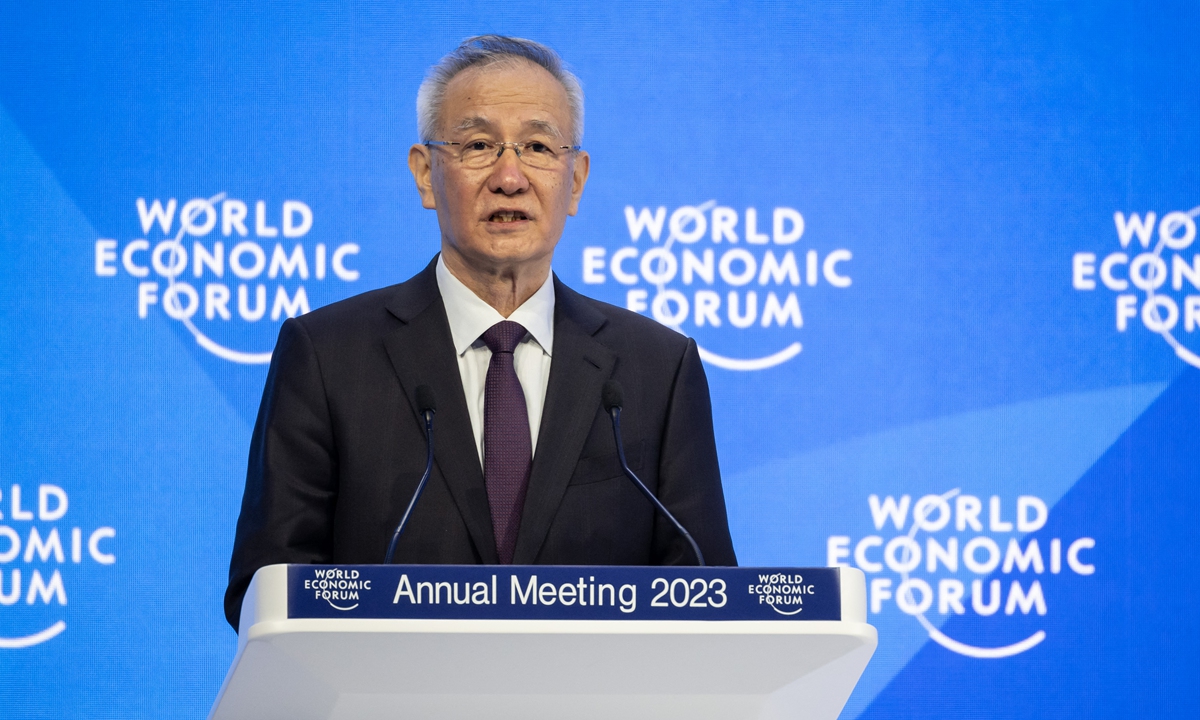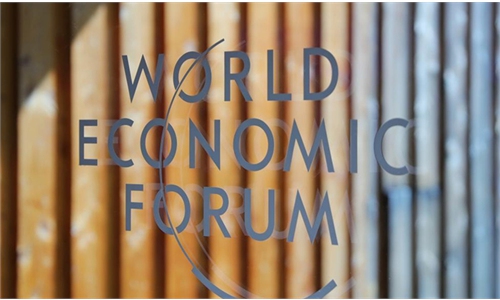China’s growth outlook, support for multilateralism underpin hope for global economy in Davos

Chinese Vice Premier Liu He speaks during a session of the World Economic Forum annual meeting in Davos on January 17, 2023. Liu said the Chinese economy will see a significant improvement this year and its growth will most likely return to its normal trend. Photo: AFP
Chinese Vice Premier Liu He on Tuesday offered a comprehensive view on China's economy and its development strategies during a speech at the World Economic Forum's (WEF) annual meeting in Davos, Switzerland, expressing confidence in an overall improvement of China's economy in 2023 and reiterating China's determination in promoting an all-round opening-up and multilateral cooperation.
As the WEF's annual meeting entered its second day with major speeches by and panel discussions among political and business leaders, one resounding theme emerged: many global business leaders and economists are increasingly pinning their hopes on China to drive global growth and help the world economy avoid a broader recession in 2023.
Beyond China's contribution to global economic growth this year, many are also expecting China to play a greater role in promoting multilateral cooperation to tackle challenges. In contrast, some Western officials continued to promote economic protectionism and instigate geopolitical tension by smearing other countries' domestic policies.
Global hope
During the speech, Liu said that China achieved a GDP growth of 3 percent in 2022 and maintained stability in prices and employment despite challenges. With various efforts, China is confident that the economy will see an overall improvement in 2023 with GDP growth returning to normal trend, Liu said.
That confidence in China's growth prospect in 2023 is also shared by many global business leaders and economists at the WEF meeting. At a panel discussion on Tuesday, several prominent business leaders pinned their hope on China to drive global growth this year and help the world avoid a broader economic recession, while other major economies are facing recession risks themselves.
"The reopening of China has to be the major event and it will be a key driver for growth," Laura M Cha, chairman of Hong Kong Exchanges and Clearing, said at the panel on Tuesday, according to Reuters.
"There's pent-up savings, there's pent-up demand, so we think that China will see very strong growth, especially as you get later in the year," Douglas L. Peterson, president and CEO of S&P Global, said at the same panel discussion, Reuters reported. Meanwhile, Credit Suisse Chairman Axel Lehmann said that "the growth forecasts now for China is 4.5%. I would not personally be surprised when that would be topped."
Such comments are also in line with the WEF's latest Chief Economists Outlook released on Monday. While warning that global "growth prospects remain anemic and the risk of a global recession is high," the report painted a brighter outlook for China's economy in 2023.
The report showed that 48 percent of the chief economists surveyed expect weak economic growth in China and only 5 percent expect high inflation. In stark contrast, 100 percent expect weak growth in Europe and 57 percent expect high inflation, while 91 percent expect weak growth in the US and 24 percent expect high inflation.
"In terms of trade, China is facing growing challenges from global recession to geopolitical concerns and we believe this trend will continue in 2023. However, we still maintain an optimistic attitude towards China's economic growth this year despite of all the challenges and uncertainties and the GDP growth would rise to about 5 percent under our neutral estimate," Darius Tang, associate director of Corporates at Fitch Bohua, told the Global Times on Tuesday.
During his speech at the WEF on Tuesday, Liu also elaborated on China's policies in various areas that has drawn widespread attention, including efforts to tackle financial risks, stabilize the property sector and boost domestic demand. Liu stressed China's support for a sound real estate market and a robust private sector. He noted that China would not go back to a planned economy as some have suggested and that China will not close its doors.
"China will always promote all-round opening up, and improve the level and quality of opening up," Liu said. "Foreign investments are welcome in China, and the door to China will only open up further."
China's growth prospects in 2023 and its continued opening-up will offer greater momentum for regional as well as global economic growth, especially as other major economies are facing risks of falling into recession, analysts said.
"With recession risks still haunting the US and Europe, China's economic reopening cannot come at a better time for the region," Hoe Ee Khor, chief economist at the ASEAN+3 Macroeconomic Research Office, said in a note sent to the Global Times on Tuesday, referring to China's recently downgraded COVID-19 management. "China's stronger economy will provide support for regional activity, while the border reopening will boost intraregional tourism."
During his speech, Liu also said that China's shift in its anti-COVID policy has been overall stable and smooth and after a period of high infection, the majority of the public has returned to normalcy and the time to reach the peak and return to normalcy has "in a sense, exceeded our expectations."
Greater contribution
The expectation for China's contribution to global economic development goes beyond short-term growth boost, but more efforts to support and spearhead multilateral cooperation to tackle various global challenges, analysts noted.
That is also palpable at the WEF on Tuesday. In introducing Liu to the forum, Klaus Schwab, founder of the WEF, said that China has made "great contribution to the development of the global economy" since its reform and opening-up policies, and amid "tremendous challenges" facing the world, the world is keen to learn about opportunities in China and its efforts to promote global cooperation.
In his speech, Liu reiterated that China opposes unilateralism and protectionism and actively promotes multilateral cooperation. Denouncing Cold War mentality and zero-sum game, Liu said that the world should jointly maintain an "equitable economic order."
"China's contribution to the world economy is mainly reflected in ideas, confidence and concrete actions," Gao Lingyun, an expert at the Chinese Academy of Social Sciences in Beijing, told the Global Times on Tuesday, noting that while some countries have expressed doubt about economic globalization, China has always supported economic globalization and multilateralism.
Rising geopolitical and economic tensions were also palpable at the WEF on Tuesday. During a speech on Tuesday, EU Commission President Ursula von der Leyen devoted much of her speech to the Russia-Ukraine conflict and boasted about the West's economic sanctions against Russia.
Von der Leyen also took an aim at China's economic policies, saying that "we will not hesitate to open investigations if we consider that our procurement or other markets are being distorted by such subsidies," even though she repeatedly stressed that Europe needs to work and trade with China and "we need to focus on de-risking rather than decoupling."
Such remarks seemed somewhat out of step at the WEF, which epitomizes economic globalization and free trade and where attendees often rail against unilateral and protectionist economic polies, analysts noted. Meanwhile, the US, which has issued protectionist policies one after another, including its so-called Inflation Reduction Act, was mostly absent from Tuesday's program in Davos, as it only sent ministerial level officials.
Amid such a complex and grim global economic outlook, "as the world's second-largest economy, China has made a significant contribution to the stable growth of the global economy, playing the role of a 'stabilizing anchor' and greatly increasing people's confidence in global economic growth," Gao said.


